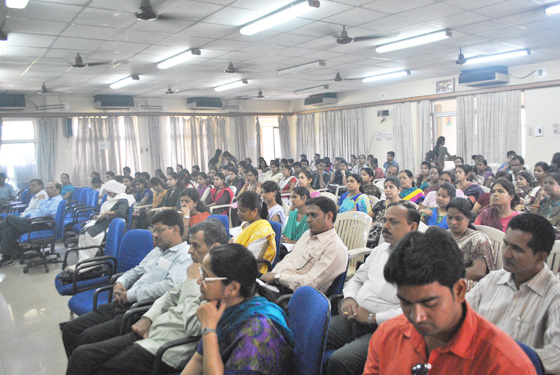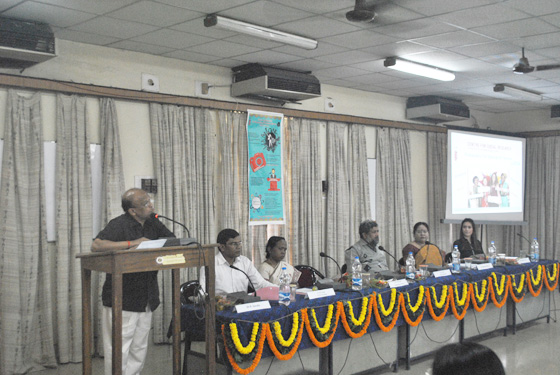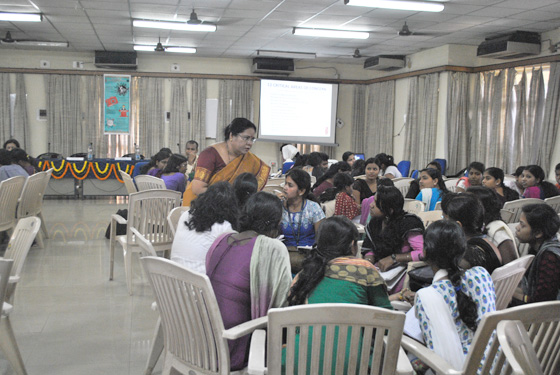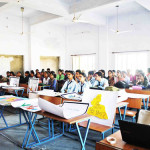The Event was organised in collaboration with of Dr. Navneeta Rath of the Sociology Department, Utkal University. Ms. Manuela Puricelli and Dr. Manasi Misha represented the CSR and managed the event. About 90 people gathered together, including PhD students, master students from several departments such as Sociology, Women’s Studies, History and English.


In the panel: Dr. Ashok Kumar Das – Vice Chancelor, Prof. Anup Kumar Dash, Dr. M.G. Bage, HoD, Dr. Navaneeta Rath and Dr. R. Garada from the Sociology Department.
Two plays were performed. The first from the Women’s studies Department student and the second one from Sociology students. Both performances contained similar issues: dowry, domestic violence, parents treating daughters and sons differently, freedom of choosing one’s own life partner and career. The play from the Sociology Department used humour to deliver the message of women and to raise the existing issues. This approach was appreciated as more capable of having an impact on the audience. It was therefore chosen for the 1k rupees prize. The majority in the audience also agreed with the CSR team’s decision.


The Winning presentation by Kirti K. Kalinga, PhD students of Sociology – Utkal University, investigated the issue of women in economy, and included stats about domestic and unpaid work, women in the informal sector, and the issues of glass ceiling and sexual harassment in the workplace. The winning image is a drawing on gender neutral education and career pathways.


Youth Suggestions:
- Awareness, skill development and technical education training should be implemented in a more vigorous way.
- Diversification of livelihood strategy and alternative livelihood skill should be developed.
- In micro-credit systems women should be encouraged to become more independent in terms of accounting and marketing knowledge.
- “Teach one another” group credit systems, mutual help and decision making systems should be improved.
Women in Armed Conflict:
- Gender sensitive refugee camps.
- Implementation of home based education training and services.
- Awareness and participation of local committees.
- Sensitisation of police.
Violence Against Women:
- Situational management should be considered.
- Pension schemes (the amount should be increased).
- Women should be make aware of their property inheritance rights.
- Focus on health issues of widows.
Women and Health:
- Effective awareness generation through workshops on women’s health, from womb to tumb.
- Government should be providing medicines and food high on protein, iron and calcium.
- Provision of medical insurance.
- Access to good health care facility and trained doctors or physicians in rural and tribal areas.
At National Level:
- Act and policies on health, medical insurance, etc need to be implemented.
- Use of technology based on media to spread awareness.
At International Level:
- Increase the number of women in Power and Decision making.
Women and Poverty:
- In every governmental level there should be women leader to motivate the women to eradicate poverty through development of knowledge and technology skills.
- Miscellaneous funds specifically for administrative areas for the eradication of poverty.
- There must be women participation in constructing the fundamental rights.
Human Rights and Women:
- Local SP and administration should be held responsible for the protection of human rights of women and special vigilance should be adopted.
- Suggesting a special women commission for the protection of human rights related to women.
Women and Media:
- There must be a balanced appointment in decision making bodies including in the media field.
- More acts and constitutional laws and articles should come in implementation.
- More media awareness should be created among the women so that they can prosper in this filed through education, training etc.
Women and Environment:
- State and local bodies should motivate women in conserving the natural environment.
- They should provide vocational training in the informal sector.
- The central and state and government should Include local women in the conversation to identify solutions for solving water problems, conservation of forest etc.
The Girl Child:
- Dhan Laxmi scheme and Ladli scheme are not properly implemented.
- Parents awareness for raising children equally.
- Proper education strategy.
Women and Education & Training:
- Sex education from early childhood.
- Same dress code in school.
- Higher education shouldn’t be gender biased.
- Community schools and community teachers in remote areas to check the dropout and never-enrolled girls rate.
- Community centres for adult women in a holistic way based on targeted approaches.
- Training for self defense should be compulsory in schools.
- Livelihood training to rural and tribal women based on the resources available.
- Ensuring girls literacy.




